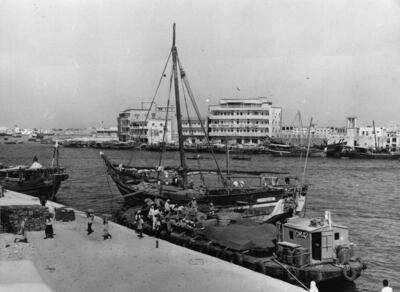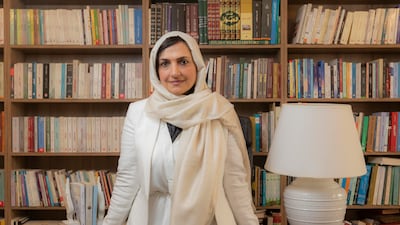Reem Alkamali became the first Emirati writer to be nominated for the International Prize for Arabic Fiction when Rose’s Diary made the longlist in January.
The Arabic novella was shortlisted in March and is in the running for the annual award that includes a $50,000 cash prize and a guaranteed English translation. The award ceremony is set to take place in Abu Dhabi on May 22.
Alkamali says the novel’s root idea, as well as the two years of research and writing it took to finish it, were driven by a single question.
“Where were all the female writers in the Emirates before the establishment of the UAE?” she tells The National. “To be more precise, who was writing creative short stories and novels in the 1960s?”
When the United Arab Emirates was established in 1971, schools were developed locally and education became free for all citizens. Primary education, meanwhile, became mandatory.
But even before the union, there were vigorous teaching initiatives for Emirati boys and girls, with schools running chiefly under Kuwaiti curriculum and supervision.
“There were schools operating in the 1940s and 1950s, and women had an important position in education,” Alkamali says. “Many went on study trips. There were also many women poets. But despite that, why couldn’t I find a story written by an Emirati woman in the 1960s?”
The young heroine of Rose’s Diary is a materialisation of Alkamali’s frustration. Rose is a student living in Dubai's neighbourhood of Shindagha in the 1960s. A natural storyteller and a bookworm with a precocious grasp of the Arabic language, she wafts between her reveries and the world around her, jotting down her observations in secret notebooks.
After the death of her mother, Rose’s uncle refuses to allow her to travel to Damascus to study Arabic literature. Angry and frustrated, she unleashes her torrent of emotions in writing. Real events, musings about social norms and existential issues are transformed into stories, plays, confessions and letters in Rose’s secret notebooks.
“She had a great awareness, as a young girl writing about politics, economics, history, colonialism, sadness, and living stories from that era,” Alkamali says, of her heroine.
One topic that takes centre stage in the 120-page work is the construction that took place in Dubai in the 1960s, which is especially fascinating given they are the maiden phases of the city’s development after oil was discovered in the UAE. In the book, Rose reflects upon traditional architectural designs and engravings that are fading “in the face of the advancing cement.”
“I think readers enjoyed those parts,” Alkamali says. “The conversation around traditional architectures.”

Rose’s Diary is a compact but rich read. Alkamali says she didn’t expect the book to be nominated for the Ipaf award, and only found out she had made the shortlist after her friends began to call to congratulate her.
Novellas don’t get much attention in the Arab world, Alkamali says, as they are caught in the limbo between short stories and novels. Yet, the form is a challenging one, requiring precision.
“The great writers have all tried their hand at writing a novella at some point,” she says. “Novellas have rules. The narrator is usually the protagonist and is confined in their inner world. Rose narrates from her inner life, and we get allusions of the lives of passers-by; Rose doesn’t delve into their thoughts. She is succinct.”
A journalist for the Arabic newspaper Al Bayan, Alkamali’s previous fiction works include 2013’s The Sultanate of Hormuz, which won the 2015 Owais Prize for Creativity, and 2018’s The Statue of Dalma, which won the Sharjah Award for Arab Creativity.
Alkamali has currently started working on a new project, and she says she is especially enthusiastic about the idea.
“I have a good idea I’m working on,” she says. “An idea like this doesn’t come along often. I’ve only written a few pages, but I am not in a hurry. It is a project that can take three years. It’s an expansive piece of work. By meaning and length.”

In an interview with the Ipaf website, Alkamali hinted that her coming novel will be connected to old Gulf manuscripts about the sea.
“Where have they all gone? There were so many of them.”
The book, she said, will begin in the 15th century, at the time of the famous navigator Ahmad ibn Majid, who was born in Julfar, or present-day Ras Al Khaimah.
"The second time period is the 18th century, when the East India Company was active, and shows the negative consequences of economic private interests. The company used to carry the manuscripts to England, together with the spoils of archaeology from southern Iraq, across the Arabian Gulf," she told the website.
"The novel then moves into the present day and tells of rich intellectuals who passionately collect old manuscripts as a hobby.”


